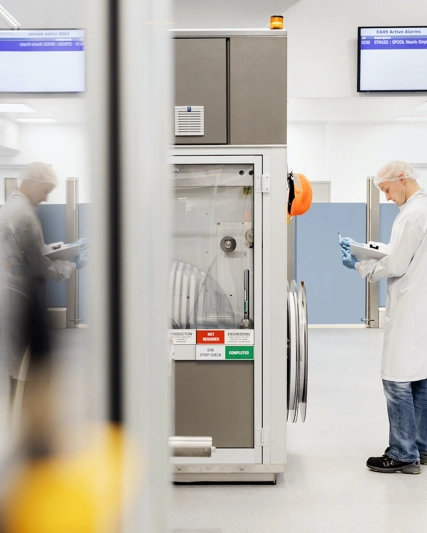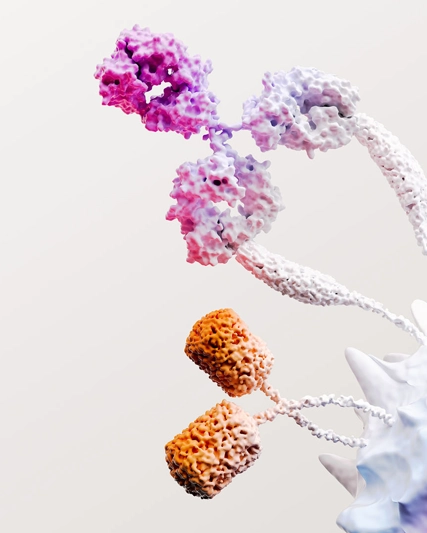Issued: London, UK
For media and investors only
GSK and Fleming Initiative scientists unite to target AMR with advanced AI
- £45m GSK funding allocated to six new research programmes combining expertise and using cutting edge AI technology to accelerate AMR research
- Leading AMR experts from Imperial College London and GSK unite to target WHO priority pathogens: Gram-negative bacteria, Aspergillus, Staph aureus (including MRSA)
- Initiative funds around 50 dedicated UK scientific and academic roles focused entirely on AMR research
- These critical projects aim to enhance understanding and advance solutions to the urgent public health threat of AMR and drug-resistant infections
GSK and the Fleming Initiative today announced six major new research programmes, called ‘Grand Challenges’ which harness some of the best scientific expertise and the latest technologies, including advanced AI, to find new ways to slow the progress of antimicrobial resistance (AMR).
According to the recent (October 2025) WHO GLASS Report highlighting a worsening global AMR situation, around one in six laboratory confirmed bacterial infections were caused by bacteria resistant to antibiotics. Annual deaths associated with AMR are predicted to rise by 74.5% from 4.71m in 2021 to 8.22 million in 2050.1
All of the new programmes announced today will begin by early 2026, are fully funded for 3 years and will cover six key themes:
- Supercharging the discovery of new antibiotics for Gram-negative bacterial infections
- Accelerating the discovery of new drugs to combat fungal infections
- Improving understanding of how our immune systems respond to drug-resistant bacteria, starting with Staphylococcus aureus, to stimulate vaccines research
- Using disease surveillance and environmental data to create AI models that predict how drug-resistant pathogens emerge and spread
- Running an innovative clinical trial to improve how and when antibiotics are prescribed
- Using international research data and insights to inform policy and public engagement, embed preventative interventions, accelerate continued R&D, and amplify societal and government action to get ahead of AMR
The Fleming Initiative – a groundbreaking collaboration established by Imperial College London and Imperial College Healthcare NHS Trust - brings together research scientists, policymakers, clinicians, behavioural experts, public and commercial partners to provide the networks, expertise and skills to provide equitable solutions to AMR at a global scale. GSK became the first founding partner of the Initiative, pledging £45m in funding in 2024 and backing the Fleming’s mission to help tackle AMR around the world and setting out a series of Grand Challenges.
One of the new research initiatives aims to find solutions to one of the major scientific hurdles in AMR which has consistently challenged the experts – breaking through the defences of Gram-negative bacteria, one of the most concerning threats to human health. These bacteria (which include E. coli, Klebsiella pneumoniae) have a complex cell envelope defence system which prevents antibiotics from accumulating inside the cell, and efflux pumps that can eject those that do. Turning the power of supercomputers on the superbugs, chemists, microbiologists and AI experts at Imperial’s Drug Discovery Hub will partner with GSK’s scientists and Agilent Technologies to use advanced automation and generate novel data sets on diverse molecules to create an AI/ML model that will enhance our ability to design antibiotics for multi-drug-resistant Gram-negative infections. These data and AI models will be made available to scientists around the world in the hope of accelerating the development of a new generation of antimicrobial drugs.
In a second Challenge announced today, scientists will drive the discovery of new drugs to combat fungal infections, starting with Aspergillus. Around two million cases of Aspergillus infection occur annually, with mortality rates upwards of 46% (in higher risk ICU patients)2 further confounded by the spread of antifungal resistance. Only four types of drugs currently exist, typically targeting the same sites within the fungal cells. This new programme will use AI to identify the unique vulnerabilities of fungi to support the development of new, targeted drugs.
A third new team of experts will begin modelling the human immune response to infection, starting with Staphylococcus aureus, one of the most dangerous drug-resistant pathogens worldwide, leading to more than one million deaths annually.3 Vaccines against this pathogen have so far failed in clinical trials due to a lack of detailed, human-relevant data on bacterial behaviour and immune responses. The new team will replicate, under strictly controlled and safe conditions, surgical site infections to provide key data on infection progression and the human immune response to S. aureus to inform new vaccine development.
In total, around 50 dedicated, multi-disciplinary scientific, clinical and academic roles will be funded by the GSK/Fleming AMR partnership and will be largely based in Imperial College London facilities in the UK. Through this, the collaboration will bring impetus to a vital field of research which has seen a declining workforce, increasingly struggling to attract the necessary scientific expertise, as highlighted by the AMR Industry Alliance report, ‘Leaving the Lab’, in 2024. All scientific research programmes are led by Imperial and GSK experts.
Professor Lord Ara Darzi, Head of the Fleming Initiative, said: “In the 12 months since we announced our landmark partnership between GSK and the Fleming Initiative, a huge amount of progress has been made. Through our convening power, we have the world-leading expertise, facilities, capacity and vision in place to be able to launch these ambitious Grand Challenges.
“Today, in the shadow of 80 years since the Nobel prize for the discovery of penicillin, we’re delighted to see this research progress. We hope this research will be a beacon for the global scientific community and highlight the urgent need for collaborative efforts to tackle the rising global threat of antimicrobial resistance.”
Tony Wood, Chief Scientific Officer, GSK, said: “I’m delighted to combine GSK’s leadership in antimicrobial science with world-leading research at Imperial College London. Together, with scaled datasets, emerging drug modalities and AI-driven models, we will open up new approaches for the discovery of novel antibiotics as well as anticipate and outpace the development of resistance to transform the treatment and prevention of serious infections. Currently, GSK has a promising portfolio of relevant assets in development, many targeting pathogens identified as priorities by WHO and US CDC. We will continue to be a leader in inspiring much more collective action, across industry, academia and policy and I believe our partnership with the Fleming Initiative is an important new step in that direction.”
Professor Hugh Brady, President of Imperial College London, said: “Antimicrobial resistance is a global challenge that no single lab or institution can solve alone. Tackling the rise of drug-resistant infections can only be done by bringing together a wide range of expertise – from across science, industry and policy, alongside public engagement. This is convergence science in action and will ensure antimicrobials continue to work for future generations.”
Professor Tim Orchard, chief executive of Imperial College Healthcare NHS Trust said: “Antimicrobial resistance is one of the biggest challenges we face in the NHS and across the world. Drug-resistant infections are increasingly difficult to treat and pose a growing risk to patients. We urgently need new solutions and interventions for tackling drug-resistant infections, which will only be achieved if we pool our expertise. These ambitious research initiatives are a fantastic example of this type of collaboration and how the Fleming Initiative will benefit both local and global communities.”
Data and insights from these programmes will be disseminated broadly with the intent to inspire development of new, more effective medicines and vaccines globally.
The news of the launch of the six Grand Challenges coincides with two significant milestones – World AMR Awareness Week and the 80th anniversary of the Nobel Prize award for the development of penicillin, the first broad spectrum antibiotic.
Also closely following the WHO GLASS report on worsening AMR, this major step is a timely call to action to the global scientific community for the urgent collaborative work required to prevent a steep increase in AMR deaths over the next 25 years.
About Fleming Initiative
Jointly established by Imperial College London and Imperial College Healthcare NHS Trust in 2022, the Fleming Initiative brings together scientists, policymakers, clinicians, commercial partners and the public to provide equitable solutions to antimicrobial resistance at a global scale.
About GSK
GSK is a global biopharma company with a purpose to unite science, technology, and talent to get ahead of disease together. Find out more at gsk.com.
About Imperial College London
We are Imperial – a world-leading university for science, technology, engineering, medicine and business (STEMB), where scientific imagination leads to world-changing impact.
As a global top ten university in London, we use science to try to understand more of the universe and improve the lives of more people in it. Across our nine campuses and throughout our Imperial Global network, our 22,000 students, 8,000 staff, and partners work together on scientific discovery, innovation and entrepreneurship. Their work navigates some of the world’s toughest challenges in global health, climate change, AI, business leadership and more.
Founded in 1907, Imperial’s future builds on a distinguished past, having pioneered penicillin, holography and fibre optics. Today, Imperial combines exceptional teaching, world-class facilities and a habit of interdisciplinary practice to unlock scientific imagination.
About Imperial College Healthcare NHS Trust
Imperial College Healthcare is one of the largest NHS Trusts in England, with over 15,000 staff providing acute and specialist healthcare to over one million people a year. The Trust runs five hospitals in central and west London - Charing Cross, Hammersmith, Queen Charlotte's and Chelsea, St Mary's and the Western Eye. Find out more: www.imperial.nhs.uk
Cautionary statement regarding forward-looking statements
GSK cautions investors that any forward-looking statements or projections made by GSK, including those made in this announcement, are subject to risks and uncertainties that may cause actual results to differ materially from those projected. Such factors include, but are not limited to, those described in the “Risk Factors” section in GSK’s Annual Report on Form 20-F for 2024, and GSK’s Q3 Results for 2025.
References
- ‘Global burden of bacterial antimicrobial resistance in 2019: a systematic analysis’. The Lancet, 2022. DOI: https://doi.org/10.1016/S0140-6736(21)02724-0
- ‘Denning DW. Global incidence and mortality of severe fungal disease’. Lancet Infect Dis. 2024. DOI: https://doi.org/10.1016/S1473-3099(23)00692-8
- ‘Global mortality associated with 33 bacterial pathogens in 2019: a systematic analysis for the Global Burden of Disease Study 2019’. The Lancet, 2022. DOI: https://doi.org/10.1016/S0140-6736(22)02185-7


